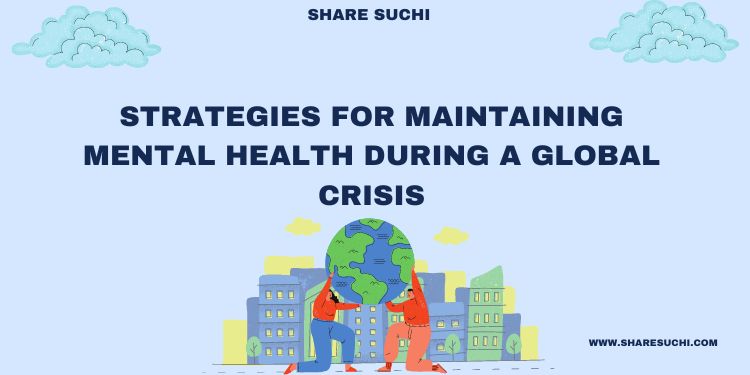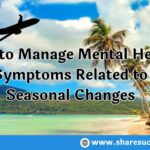Are you searching for strategies for maintaining mental health during a global crisis or pandemic?
When the world is turned upside down by a global crisis or pandemic, it’s easy to feel overwhelmed. The uncertainty, the constant news updates, and the isolation can take a toll on mental health.
However, there are ways to navigate these challenging times with resilience. Below are some practical strategies to help maintain mental well-being during a global crisis.
Table of Contents
Here’s The Strategies for Maintaining Mental Health During a Global Crisis
Stay Connected with Loved Ones
Isolation can amplify feelings of anxiety and depression. While physical distancing might be necessary, staying socially connected is crucial. Utilize technology to keep in touch with family and friends.
Regular video calls, group chats, or even a simple phone call can make a significant difference in your emotional well-being. Sharing your feelings with loved ones can provide comfort and remind you that you’re not alone.
Limit Exposure to Stressful News
While staying informed is important, too much exposure to news—especially negative or sensational content—can increase stress and anxiety. Set specific times to check updates and stick to reliable news sources.
Avoid constantly scrolling through social media or watching 24-hour news channels. Instead, focus on activities that bring joy and relaxation.
Establish a Routine
A crisis can disrupt daily routines, leading to feelings of chaos and loss of control. Creating a new, flexible routine can help restore a sense of normalcy. Include time for work, exercise, meals, and relaxation.
Establishing regular sleep patterns is also vital for mental health. A routine provides structure and helps you stay grounded during uncertain times.
Practice Mindfulness and Meditation
Mindfulness practices like meditation, deep breathing, and yoga can reduce stress and increase resilience. These practices help you stay present, rather than getting lost in worries about the future. Even just a few minutes a day can make a big difference.
There are numerous apps and online resources available that offer guided meditation sessions, making it easier to get started.
Stay Active
Physical activity is not only good for your body but also your mind. Exercise releases endorphins, the body’s natural mood lifters.
Whether it’s a home workout, a walk in the park, or even some gentle stretching, staying active can help reduce anxiety and improve your overall mood. If you can, spend time outdoors in nature, which has been shown to have a calming effect.
Seek Professional Support if Needed
If you’re struggling to cope, it’s important to seek help. Many mental health professionals offer telehealth services, providing support from the safety of your home.
Don’t hesitate to reach out to a therapist or counselor if you’re feeling overwhelmed. Sometimes, talking to a professional can provide new perspectives and coping strategies.
Focus on What You Can Control
A global crisis can make you feel powerless, but it’s helpful to focus on what you can control. Create a list of things you can do to protect yourself and your loved ones, like following health guidelines, practicing good hygiene, and helping others in need.
By taking proactive steps, you can regain a sense of agency and reduce feelings of helplessness.
Engage in Creative Activities
Creative expression is a powerful way to manage stress. Whether it’s painting, writing, playing music, or cooking, engaging in creative activities can provide an emotional outlet.
These activities can also serve as a distraction, giving your mind a break from the worries and uncertainties of the world.
Maintain a Healthy Diet
What you eat can have a significant impact on your mood and energy levels. Aim to eat a balanced diet with plenty of fruits, vegetables, and whole grains.
Avoid excessive consumption of alcohol, caffeine, and sugary foods, which can contribute to anxiety and mood swings. Drinking plenty of water and staying hydrated is also crucial.
Practice Gratitude
In challenging times, it’s easy to focus on what’s going wrong. Practicing gratitude can help shift your mindset. Take a few minutes each day to reflect on the positive aspects of your life.
Writing down what you’re grateful for can boost your mood and help you maintain a positive outlook, even during tough times.
Conclusion
Global crises are undoubtedly challenging, but by adopting these strategies, you can better manage stress and protect your mental health. It’s okay to feel anxious or uncertain, but it’s important to take proactive steps to care for your well-being.
Stay connected, stay active, and don’t hesitate to seek help when you need it. Your mental health is just as important as your physical health, especially during times of global uncertainty.
FAQs
How can I manage feelings of anxiety during a global crisis?
Managing anxiety during a global crisis involves a combination of strategies. Start by practicing mindfulness and meditation to calm your mind. Limit exposure to distressing news and focus on staying connected with friends and family through virtual means. Establish a daily routine and incorporate physical activity to boost your mood. If anxiety becomes overwhelming, consider speaking with a mental health professional for additional support.
What are some effective ways to stay socially connected while practicing physical distancing?
To stay socially connected while maintaining physical distancing, utilize technology such as video calls, group chats, and social media platforms. Organize virtual gatherings or game nights with friends and family. Write letters or send care packages to loved ones to maintain a personal touch. Engaging in online communities or support groups related to your interests can also provide a sense of connection.
How can I create a daily routine that works during a global crisis?
Creating a daily routine during a global crisis involves setting a structured yet flexible schedule. Start by allocating specific times for work, exercise, meals, and relaxation. Incorporate activities that bring you joy and help you unwind. Adjust your routine as needed to accommodate changes in circumstances. The key is to find a balance that maintains a sense of normalcy while allowing for adaptation.
What role does diet play in mental health during a pandemic?
Diet plays a significant role in mental health, especially during a pandemic. A balanced diet rich in fruits, vegetables, whole grains, and lean proteins supports overall well-being. Foods high in omega-3 fatty acids, such as fish and nuts, can enhance mood. Limiting caffeine, alcohol, and sugary foods can prevent mood swings and anxiety. Staying hydrated is also crucial for maintaining mental clarity and energy levels.
How can creative activities help improve mental health during stressful times?
Engaging in creative activities provides an emotional outlet and a distraction from stress. Activities like painting, writing, or playing music allow for self-expression and can improve mood. Creativity stimulates the brain and can lead to a sense of accomplishment and satisfaction. During stressful times, focusing on creative projects can reduce anxiety and help you stay mentally engaged and positive.


